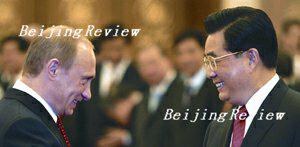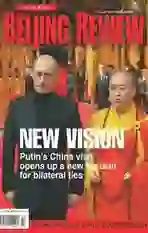Putin’s Visit Bears Fruit
2006-12-11DINGYING
DING YING
The Russian Presidents trip to China marks progress in overall cooperation between the two countries

If one word could be used to describe Russian President Vladimir Putins recent visit to China, it would be “fruitful.” During his brief two-day stay, which began March 21, Putin had a compact agenda--he met with his Chinese counterpart, President Hu Jintao, Chinese Premier Wen Jiabao and Chinas top legislator Wu Bangguo, attended the opening ceremony of the Year of Russia and a high-level Sino-Russian economic forum, and signed 15 agreements. Seven more agreements, ranging from culture to the media and education, were to be signed by ministries from both countries.
Putin rounded out his China tour by visiting the Shaolin Temple in Henan Province, the martial arts shrine of China and the world.
During their talks, Hu and Putin agreed that “bilateral relations are at an unprecedented level of development” as they pointed to the fruitful cooperation achieved under the 10-year-old Sino-Russia strategic partnership of cooperation.
Hu said he firmly believed that Putins visit would boost that strategic partnership, and China is willing to push forward bilateral cooperation in trade, high technology, energy, and cross-border water protection.
Hu also noted that this year marks the fifth anniversary of the Sino-Russian good neighborly treaty of friendship and cooperation.
Bilateral agreements signed
The most significant achievement was the signing of a series of bilateral agreements, including an overarching document titled the China-Russia Joint Statement, in which the two countries cooperative plans were fully reflected, ranging from politics and diplomacy to energy and finance.
“The two sides support each others policies to safeguard national sovereignty, unity and territorial integrity,” the statement said.
Russia expressed its strong support for the one-China policy, noting that “the Russian side will continue to adhere to the one-China policy and recognize the government of the Peoples Republic of China as the sole legitimate government of the whole of China.”
The statement also noted that “Taiwan is an inalienable part of the Chinese territory,” saying that Russia opposes Taiwans joining the United Nations or other international organizations that only sovereign nations can join, and will not sell weapons to Taiwan.
China and Russia, sharing a 4,300-km-long border, settled their boundary disputes last year after 40 years of negotiations. “The completion of the demarcation and the smooth implementation of the agreement on strengthening military trust and the mutual reduction of armed forces on the border areas, as well as the agreement on common economic use of certain islands in the border rivers and surrounding waters during the past 10 years, are conducive to peace and friendship in the China-Russia border areas,” the statement said. The two sides reiterated that they would finish the demarcation of the last two previously disputed areas along the China-Russia border by the end of 2007.
“The energy cooperation between China and Russia, as an important part of the Sino-Russian strategic partnership of cooperation, is witnessing a high level of development, and is of great significance for further deepening bilateral economic cooperation,” the statement said.
It stressed that the “energy departments and companies of the two countries are working actively to promote pipeline projects to supply crude oil and natural gas from Russia to China.” China and Russia encourage companies from both nations to invest in oil and gas exploration in order to tap the energy potential of both nations, according to the statement.
The two countries also pledged close cooperation in international affairs in areas where they hold similar stances. They will work closely to resolve the Iranian and North Korean nuclear issues.
The two countries vowed to step up coordination within the framework of the Shanghai Cooperation Organization (SCO), which groups Russia, China and four Central Asian states--Kazakhstan, Kyrgyzstan, Tajikistan and Uzbekistan. The joint statement said the stability and security of Central Asian nations, as well as their constant economic and social development, are in the immediate interest of China and Russia.
“China and Russia will take the development of the SCO as a key link of diplomacy and continue to closely coordinate stances within the framework of the SCO,” the statement said.
Both China and Russia support an early resumption of the Palestinian-Israeli peace negotiation process, and the formation of a Palestinian state, which enjoys sovereignty and democracy, and shares security and peace with its neighbor, Israel.
Both countries maintain that the situation in Iraq should be stabilized as soon as possible, and Iraqs sovereignty, unity and territorial integrity should be safeguarded, according to the statement.
Enhanced energy cooperation

PURE ELEGANCE: Russian dancers perform at the opening ceremony of “The Year of Russia”
Noting that Putins visit achieved “comprehensive” results and added “new” and “concrete” content to the strategic partnership between the two countries, Russian Foreign Minister Sergei Lavrov said that the partnership is “irreversible.”
“Energy cooperation between the two countries covers all aspects and the two sides will continue to strengthen and expand cooperation in the fields of civil aviation, space exploitation, agriculture, antiterrorism and labor services,” said Lavrov.
China and Russia signed three deals on oil and natural gas cooperation on March 21, including a summary of negotiations between China National Petroleum Corp. (CNPC) and Transneft, a Russian pipeline company, and the Russian oil company Rosneft on forming joint ventures for further oil cooperation. “In 2005, Russia exported to China more than 8 million tons of crude oil and became Chinas fifth largest energy supplier,” said Putin. With the implementation of these projects, “the crude oil supply to China will definitely see an increase,” he added.
CNPC, the countrys biggest energy firm, and Russian gas giant Gazprom signed a contract to build two gas pipelines reportedly costing up to $10 billion. Gazprom CEO Alexei Miller was quoted by Xinhua News Agency as saying that one of the pipelines would deliver gas from western Siberia and the other from Russias Far East. Each of the pipelines would be capable of delivering 30 to 40 billion cubic meters of gas each year. CNPC and Russian oil pipeline firm Transneft also signed a deal confirming a joint feasibility study on a spur to China of the $11.5 billion East Siberia-Pacific Ocean oil pipeline, to be completed in 2008.
CNPC also signed a deal with Rosneft to establish joint ventures to refine crude oil and sell oil products. Sergei Bogdanchikov, President of Rosneft, said the company plans to increase its exports of crude oil and oil products to China from 7.1 million tons in 2005 to 12.7 million tons this year.
In his talks with Putin, Chinese Premier Wen stressed that the stable and mutually beneficial economic and trade cooperation between China and Russia fits the long-term interests of both nations. The two countries should continue to expand bilateral trade, optimize the trade structure, enhance energy cooperation and encourage mutual investment, so as to lay a more solid base for the development of bilateral relations, he said.
A boost to trade
Figures from Chinese customs showed the trade volume between China and Russia in 2005 reached $29.1 billion, up 37.1 percent year on year, which was 14 percentage points higher than the growth rate of Chinas total foreign trade.
China is now Russias fourth largest trade partner, and Russia is Chinas eighth largest trade partner. By the end of 2005, Chinas contracted investment in Russia totaled $977 million, mainly in the fields of energy, mining, forestry, trade, textiles, telecommunications, construction and real estate.
A huge potential in bilateral trade cooperation still exists, Putin said. “The China-Russia trade volume will surely meet the set goal of $60-80 billion in 2010,” he added.
Meanwhile, by the end of 2005, Russias contracted investment in China totaled $1.405 billion, mainly in the areas of manufacturing, construction and transportation. Moreover, by the end of 2005, more than 10,000 Chinese-funded enterprises had been set up overseas, with signed contracted projects worth $181.1 billion, according to Chinas Ministry of Commerce.
Putin was accompanied by a delegation of about 90 people, many of whom are key Russian entrepreneurs in the fields of energy, banking, telecommunications, media and other industries. As a result, a Sino-Russian economic and trade forum was held during the visit.
The two countries decided to hold the Year of Russia in China this year and the Year of China in Russia in 2007,which will further pragmatic cooperation in every area and make new breakthroughs in key areas.
Inaugurating the Year of Russia in China, which involves more than 200 activities, Putin said the event shows that Russia-China relations have reached “a very high level and will lay a better foundation for their future development.”
Analysts pointed out the upcoming events in the next two years will further enhance ties between the two countries, and a stable, healthy China-Russia relationship not only conforms with the national interests of the two countries but also contributes to global peace, stability and development.
